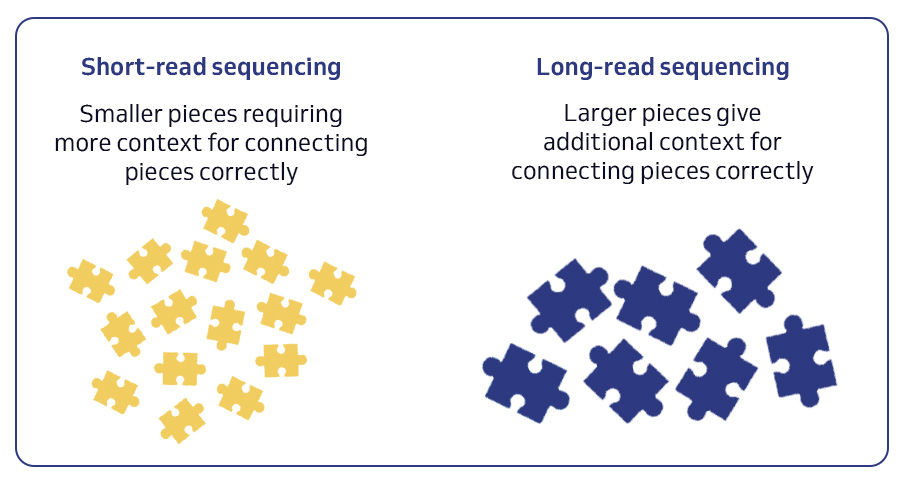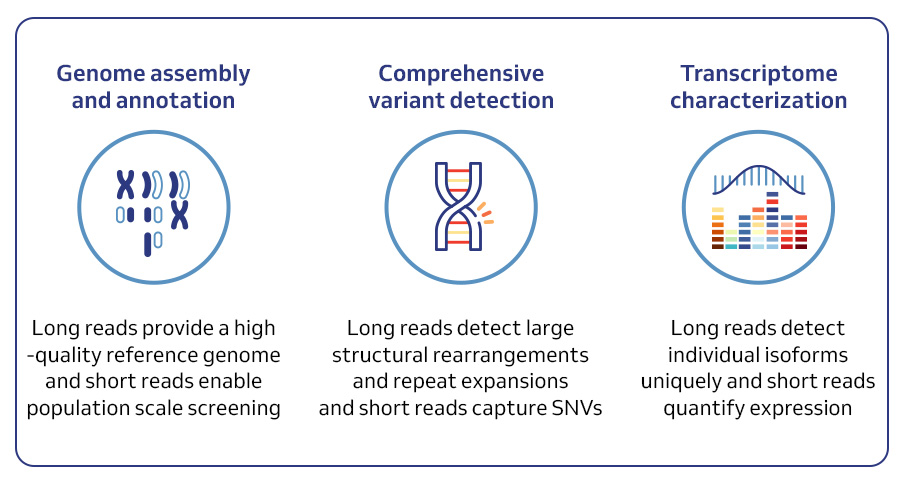By Michelle Vierra Balakrishnan
Short-read sequencing technologies have, without a doubt, revolutionized genomics. The ability to look at genetic variants at the base pair level and compare gene expression levels between normal and other conditions has made it possible to diagnose more diseases, develop more robust crops, and protect the biodiversity here on Earth.
However, short reads are inherently limited and often fall short in fully characterizing complex genomes and transcriptomes. Short reads struggle to resolve repetitive regions, assemble complex structural variants, and fully capture isoform diversity. This is where the power of PacBio long-read sequencing comes into play.
PacBio HiFi sequencing delivers highly accurate long reads, enabling us to more fully profile not only the bases involved, but the context in which genetic variation exists. The ability to sequence every base in a genome or transcriptome opens doors previously blocked by extreme GC content, repeat rich regions, and long stretches of homozygosity. And as scientists dedicated to making the world a healthier place, MedGenome now offers researchers an unparalleled ability to delve deeper into the intricacies of genomes and transcriptomes with both short-read and long-read sequencing solutions.

A comprehensive suite of PacBio solutions
- De novo genome assembly and annotation solution:
- Generating high-quality, contiguous genome assemblies for any organism, regardless of complexity.
- Identifying and annotating genes, isoforms, and regulatory elements with greater accuracy than ever before.
- Understanding the complete genomic blueprint of an organism, crucial for evolutionary studies, conservation efforts, and agricultural advancement.
- Comprehensive human variant detection solution:
- Detecting all types of genetic variation, including SNVs, Indels, SVs, and variants in complex regions, with high confidence.
- Providing haplotype-resolved variant information, crucial for understanding inheritance patterns and disease mechanisms.
- Enabling more accurate diagnosis, personalized treatment strategies, and a deeper understanding of human health and disease.
- Full-Length RNA sequencing solution:
- Capturing the complete length of RNA transcripts, providing a comprehensive view of isoform diversity.
- Identifying novel transcripts and fusion genes, crucial for understanding disease mechanisms and identifying potential drug targets.
- Offering both bulk and single-cell full-length RNA sequencing, enabling researchers to dissect cellular heterogeneity and unravel the complexities of gene expression at single-cell resolution.
Combined capabilities – your omics superpower
The future of genomics lies in leveraging the strengths of both short-read and long-read technologies. This hybrid approach, combining the comprehensiveness of long reads with the affordability and counting ability of short reads, will undoubtedly accelerate discoveries and advance our understanding of complex biological systems.

From strategy to publication: crafting omic insights with your research in mind
At MedGenome, we believe in the power of comprehensive genomic exploration. That’s why we offer both short-read and PacBio long-read sequencing services, allowing you to choose the best strategy for your specific needs or combine both for unparalleled insights. Whether you’re assembling complex genomes, characterizing cryptic genetic variation, or unraveling the complexities of the transcriptome, our expert team is here to guide you every step of the way. Contact us today to discuss how our comprehensive suite of sequencing solutions can empower your next breakthrough discovery.
#De novo genome assembly and annotation, #human variant detection, #Full-Length RNA sequencing, #long-read sequencing, #pacbio
 US
US IN
IN

